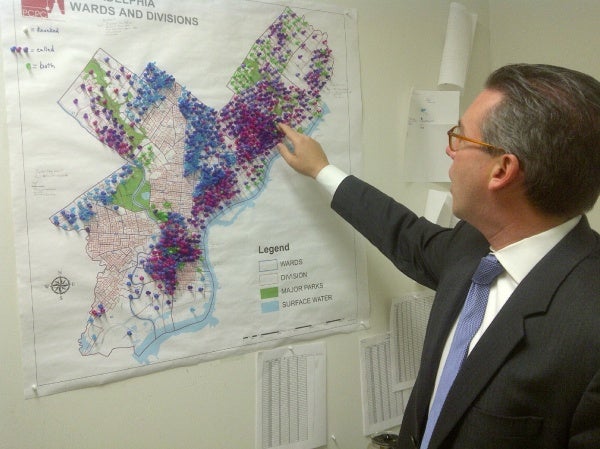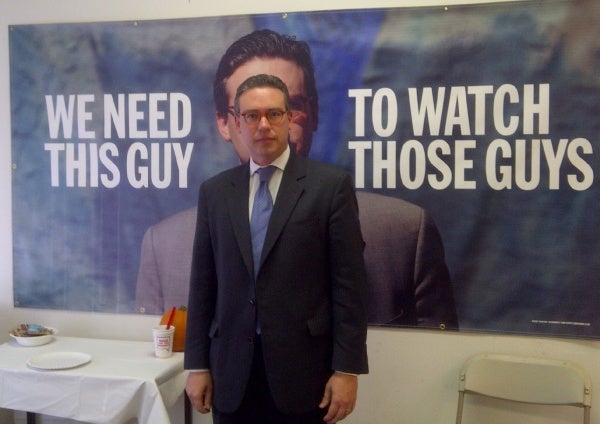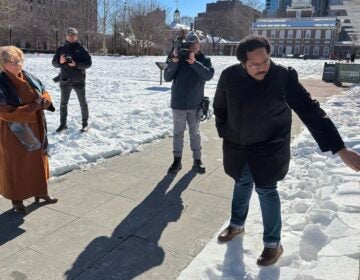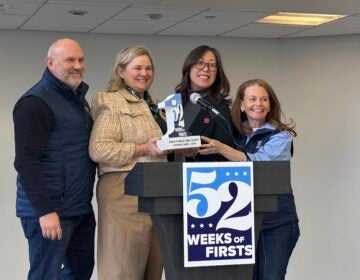Al Schmidt sees his Election Day victory as a defeat for the political machine
-

Philadelphia City Commissioner Al Schmidt says he can’t offer an opinion about how complete the list of 7,702 voters is, since Pennsylvania Department of State officials haven’t described how it was generated. (File photo)
-

As he traveled from polling place to polling place in one final Election Day push to get votes in the City Commissioner’s race, Al Schmidt was writing his concession speech. It was generic. Wish it would have gone differently. Thanks for your support and hard work. We fought a good fight.
A history buff with a PhD in the field, Schmidt got to thinking about two figures with whom he was obsessed: Richardson Dilworth, the former Philadelphia mayor who ended Republican rule, and Boss Tweed of Tammany Hall infamy.
“Tweed once said we can beat reformers every time because they’re like a rocket. They go off with a lot of fanfare, explode and just go away, because they’re not professional political machinists,” said Schmidt, an East Falls resident. “I always figured you beat them by just staying in the ring. They just can’t sustain it.”
Schmidt was saying those words on Thursday, two days after the Republican beat incumbent City Commissioner Joseph Duda by nearly 10,000 votes (roughly 3 percent), thus rendering the speech he’d been composing moot.
“Here’s the fundamental mistake they made: We set out to earn votes not based on [political] deals. They depended on them,” Schmidt said, adding that his team “was dedicated and motivated for all the right reasons.”
He ran as a reform candidate on a platform of ethics, integrity and transparency for an office that most Philadelphians don’t really know much about. In fact, Schmidt said, the lack of transparency in an office that oversees elections across the city puts him in the awkward position of not knowing exactly what he’ll be getting himself into come January.
What Schmidt does know is this: He got votes from both parties with the help of fellow Republicans and Democrats who probably noticed the mailer with former Gov. Ed Rendell’s seal of approval. While he was down early, he saw key districts going his way or how he stayed within 200 votes in Duda’s humongous 66th Ward in the Far Northeast despite elements of both parties being against him.
“Either elections are fair or they aren’t fair, honest or they aren’t honest. This race is not as much into party ideology as others,” the one-time City Controller candidate said. “That’s the message we had that coincidentally dovetailed with Stephanie Singer’s.”
Singer is another newly elected City Commissioner, the one who ousted longtime office head Marge Tartaglione in the Democratic primary. Though separately, both sought office with a message of bringing change to it. Both successfully did so Tuesday. (“That wasn’t a product of ‘let’s get together and figure out what we’re going to say,” Schmidt noted.)
John Featherman, an unsuccessful Republican mayoral candidate who is aligned with Schmidt’s insurgent movement, said, “Schmidt had tremendous bipartisan appeal because he’s viewed more as a reformer and less as a partisan Republican. That’s why many Democratic ballots had Al’s name on it.”
Another thing that helped his campaign was a Philadelphia Weekly story which called Duda’s use of a city car into question; the mailer Schmidt based off of it noted that taxpayers paid for enough gas for the incumbent to drive to the shore 240 times in 2010.
Schmidt said his path to the office started more than five years ago when, in calling the City Commissioner’s office to get basic election results, one person asked which party he was affiliated with and the next person asked why he wanted the numbers in the first place. It was a run-around, he said, to control information and who has access to it.
During this campaign, Schmidt faced ward leaders including Duda’s name on their ballots and heard whispered smears that he was “running in an attempt to destabilize elections” and that he “was a Tea Party candidate cloaked in a progressive’s clothing.”
His version: he was originally an independent who ultimately registered Republican; on fiscal issues, he aligns with his party for the most part, but “social issues are different.”
The office’s insular nature leaves Schmidt unable to talk about what he’ll do on day one. “At this point,” he said, “I’m flying blind.”
One thing he knows he’ll call for is a press conference to announce that someone in the office will be dedicated to fielding calls from, and providing constituent services for, residents registered with third parties. The way the office currently operates Democrat callers get referred to Democrat commissioners and same for Republicans but there’s no mechanism for anybody else.
“We’re responsible for educating voters,” he said. “I want to make sure everyone who is eligible to vote is registered to vote and to get every one of them to vote.”
WHYY is your source for fact-based, in-depth journalism and information. As a nonprofit organization, we rely on financial support from readers like you. Please give today.




